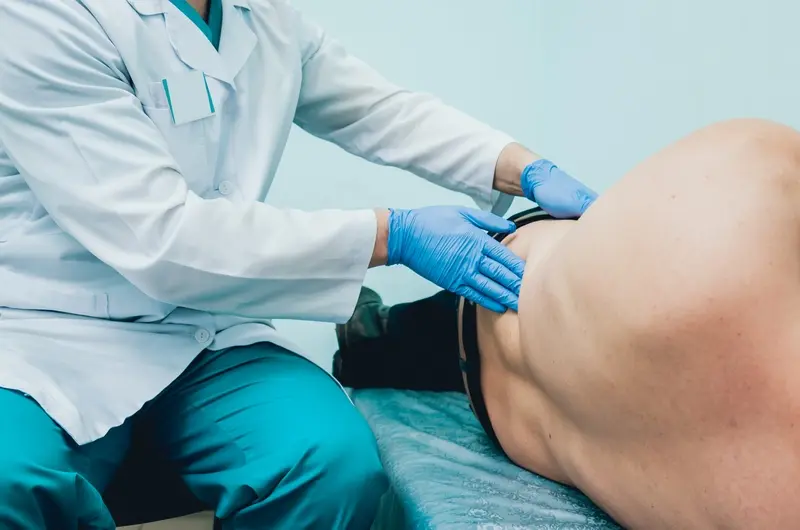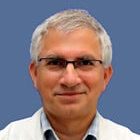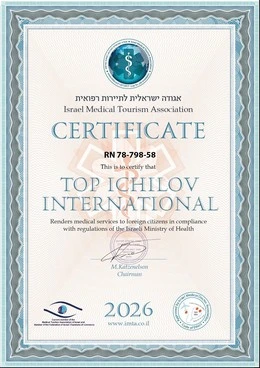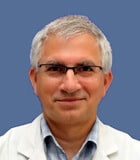Prostate Cancer Treatment in Israel

Israeli physicians revise the diagnosis and, if necessary, prescribe treatment. Preference is given to minimally invasive organ-preserving surgeries that help maintain the man’s quality of life and cause no complications.
The Top Ichilov surgeons operate on prostate cancer patients using the da Vinci Xi surgical robot. This is the latest da Vinci robotic surgical system. Procedures are performed by Doctor Meyer David Gershbaum, one of the world’s leading specialists in robot-assisted urologic surgeries.
Having contacted Top Ichilov for prostate cancer screening, diagnosis or treatment, the patient finds himself in the center of attention and among Israel’s leading experts. A multidisciplinary team includes the following specialists:
- oncologist;
- surgeons;
- urologic radiation oncologist;
- andrologist.
What To Expect From Prostate Cancer Diagnosis In Top Ichilov
The 1st day.
Primary examination:
- Physical exam and consulting.
- Analysis of medical documents brought by the patient.
- Health history assessment.
- Referrals to tests and instrumental studies.
- Revision* of slides and/or paraffin blocks with tissue samples in the laboratory. Gleason score calculation.
*The patient has to bring a medical document identifying his slides/blocks.

The 2nd day.
The patient is prescribed the following tests:
- Complete blood count and blood biochemistry.
- Tumor marker blood tests.
- Urinalysis. PSA blood test.
The 3rd day.
Treatment planning:
Professor Haim Matzkin summarizes the results of the diagnostic procedures and develops a treatment plan. If necessary, the professor refers the patient to one of the experts:
- surgeon – Dr. Gal Keren Paz;
- radiologist – Dr. D. Matseevski;
- oncologist – Doctor I. Stefanski.
Length of a complete diagnostic examination in Israel: 3-4 working days. Price: $4714.
Comprehensive prostate cancer telemedicine package: $590.
✓ Right Now: Get your free consultation with a Top Ichilov physician
It is important to correctly determine the type of the disease before starting treatment in the country of residence. Consult an Israeli physician right now, free of charge. Find out the prices for the necessary diagnostic procedures in Top Ichilov.
What Are The Benefits Of Prostate Cancer Treatment In Israel?
- Brachytherapy. In Israel, prostate cancer is treated with brachytherapy, or weak internal radiation therapy. During brachytherapy, the doctor implants about 60 radioactive beads into the diseased prostate tissue. This treatment method only affects prostate tumor tissues and helps to avoid damage to other organs.
- Minimally invasive surgeries. Surgical cancer treatment in Israel usually implies minimally invasive surgery performed through tiny holes in the abdominal wall. The doctor inserts a miniature video camera and surgical manipulators through these small incisions. This approach decreases blood loss, reduces the postoperative hospital stay and minimizes the risk of complications.
- The biopsy technique. During cancer diagnosis in Israel specialists normally take 16 tissue samples from different areas of the prostate gland (in CIS countries, doctors only take 10-12 samples). This allows for more accurate assessment of cancer spread.
Doctors Specializing In Prostate Cancer Treatment In Top Ichilov
Prostate cancer diagnosis and treatment in Top Ichilov is provided by Israel’s leading oncologists:

Professor Haim Matzkin – famous urologist, urologic oncologist, urologic surgeon. Has been included in the top list of the best Israeli physicians for several years. Performs all types of urologic and oncourologic surgeries.

Doctor Irina Stefanski – oncologist, Head of Chemotherapy Department, Deputy Head of Oncology Department. Professional experience in oncology: about 27 years. One of the best Israeli experts in comprehensive cancer therapy.

Professor Yuza Hen – urologist, sexual health specialist, leading expert in erectile dysfunction treatment. Also offers therapy for prostatic diseases, including inflammatory prostate conditions.

Professor Einat Even-Sapir – the best Israeli expert in nuclear medicine. Interprets PET/CT scans which are used for cancer staging and metastasis detection all over Israel.
What Methods Of Prostate Cancer Treatment Are Used In Israel?
If you’ve been diagnosed with prostate cancer, your doctor will discuss the best treatment options with you. The disease management will depend on several factors, including:
- the patient’s age and overall health;
- the cancer stage and grade;
- the spread of cancer;
- treatment side effects.
The treatment of prostate gland cancer is planned individually, according to the patient’s needs.
Radiation Therapy For Prostate Cancer

Radiation is often used to treat cancer of the prostate gland in Israel. On the earlier stages of the disease patients can choose either surgery or radiation with comparable results. If the tumor is larger or more aggressive, radiation therapy may be combined with hormone therapy. Radiation therapy is also used when the cancer has not been removed completely during surgery or has come back.
The Top Ichilov specialists use the newest radiation therapy techniques in order to ensure more precise, focused tumor irradiation with maximal dose in a target point. These techniques prevent excessive damage to healthy cells.
The Top Ichilov Clinic offers cutting-edge radiation therapy for cancer of the prostate gland.
Intensity-modulated radiotherapy (IMRT) helps focus the highest number of beams on the tumor without irradiating healthy tissues.
Brachytherapy For Prostate Cancer
Brachytherapy is implantation of about 60 radioactive beads into the prostate cancer tissue. This ensures weak internal irradiation which differs from external radiation therapy by minimal damage to the surrounding organs. Brachytherapy is performed as a single day procedure and does not require hospitalization.
The procedure takes about an hour and is done under local anesthesia. In Israel, brachytherapy is performed by a urologic oncologist together with a nuclear physicist. Indications for brachytherapy: Gleason score – less than 7, PSA – lower than 12. It may also be indicated even if the patient has solitary metastases in the surrounding lymph nodes. The surgical prostatic capsule must be intact. This method is characterized by the lowest risk of side effects and 93% success rate. The procedure is performed personally by Professor H. Matzkin, the leading prostate cancer specialist in Israel.
Surgery
Doctor Gal Keren Paz, urologic surgeon and expert in laparoscopic prostate surgery, works in the Top Ichilov team and offers cutting-edge, personalized prostate cancer treatment methods.
What to Expect During the Postoperative Rehabilitation
- Urogenital function. After radical prostatectomy, most men experience stress urinary incontinence (small urine leakage when laughing, sneezing, coughing, etc.). This can persist for 3 days to 3 months after the procedure. 90% of patients successfully restore their pre-operative level of continence within a few days after the surgery. 95% of patients restore their continence within one year. Less than 5% report chronic problems with urine leakage.
- Sexual function. Since the prostate gland and seminal vesicles produce most of the sperm, after prostatectomy the ejaculate contains no prostatic secretions. The chance to preserve the man’s erectile function (the ability to maintain erection for sex) depends on the following factors:
- age;
- sexual function before the surgery and health history;
- number of preserved nerve tracts;
- surgeon’s experience and qualification;
- use of radiation therapy.
Orchiectomy

An orchiectomy is surgical removal of testicles. An orchiectomy is an effective and convenient way to decrease testosterone levels. After the procedure, however, most men are unable to get an erection. Before hormone therapy, all patients are offered single-time breast irradiation in order to prevent gynecomastia (female-type increase in breast size), a complication that develops in most men after testosterone blockade.
Laparoscopic Surgery
This is a minimally invasive technique. Endoscopic instruments are inserted through tiny holes in the abdominal wall. A tiny video camera and surgical manipulators are connected to the end of the endoscope. The Top Ichilov surgeons specialize in nerve-preserving procedures. This means that the patient’s urogenital function may be fully restored.
This method has a number of evident benefits:
- Lesser blood loss.
- Shorter postoperative hospital stay.
- Fewer scars in the urinary tract.
- Fewer complications during surgery.
The operating surgeon’s experience is extremely important. It will affect the treatment results more than any toolset or equipment.
Radical Prostatectomy
A radical prostatectomy is surgical removal of the entire prostate gland, both seminal vesicles and a short segment of the urethra that passes through the prostate gland. The surgical incision is done in the lower part of the stomach. Some patients also have one or several groups of pelvic lymph nodes removed (lymphadenectomy, or lymph node dissection).
If prostate cancer is more widespread, the surgeons also remove one or both neurovascular bundles that affect sexual function. The surgery lasts about 1 hour.
Hormone Therapy
Most prostate gland tumors depend on the androgen levels. Testosterone is the most significant androgen. Approximately one third of prostate cancer patients need hormone therapy (so-called androgen deprivation) in order to block the production of testosterone which interacts with cancer cells. This either decreases the size of the tumor or delays its growth. Even though hormone therapy can help treat prostate cancer, it is unable to cure the disease.
Hormone therapy is mostly used for late-stage, high-grade prostate cancer (Gleason score 8 or higher) or in patients with prostate tumors that have spread outside the prostate gland. Nevertheless, doctors have different opinions as to duration and timing of hormone therapy. Hormone therapy can be used for prostate cancer treatment if:
- there are contraindications to surgery or radiation therapy;
- there are solitary metastases or cancer recurrence.
Types of prostate cancer hormone therapy:
- Antiandrogens are drugs that block the synthesis of testosterone. They are taken daily. Antiandrogens are mainly used in combination with LRF agonists.
- LRF antagonists are drugs that stimulate the production of luteinizing hormone-releasing factor (LRF) in the pituitary gland. Increased LRF production gives the signal to reduce the synthesis of testosterone.
Treatment implies either injections or subcutaneous implantation of special pellets that release the drug slowly. The course of treatment lasts 1 to 6 months.
Chemotherapy For Prostate Cancer
Most doctors recommend chemotherapy for prostate cancer that has spread into other areas of the body and does not respond to hormone therapy. Docetaxel is one of the standard chemotherapy agents used for the treatment of prostatic adenocarcinoma. Cisplatin-based chemotherapy is used for the treatment of small malignant tumors of the prostate gland.

Gene Therapy
The special genetic analysis of the tumor helps select the most effective and sparing treatment for prostate cancer.
Cryotherapy
This treatment method destroys the tumor by exposing it to low temperatures. The exposure is ensured with the help of a long, slender probe. X-rays or other methods of medical imaging provide the necessary control.
Active Surveillance (Watchful Waiting)
Since prostate cancer usually grows slowly, some patients, especially older men and those with comorbidities, have a very low risk of dying from prostate cancer. In these cases, doctors may recommend active surveillance, or so-called “watchful waiting”. This approach includes careful cancer surveillance without active treatment (such as surgery or radiation therapy).
Doctors routinely perform biopsies and PSA tests. They may recommend treatment if either the Gleason score is rising or the tumor is growing fast. Long-term trials of active surveillance for prostate cancer show that with this approach, about 70% of men can survive for up to 10 years without treatment.
What Happens To Sexuality After Prostate Cancer Treatment?
The recovery of the erectile function depends on the surgical technique and the doctor’s qualification. After robot-assisted surgeries performed by the Top Ichilov doctors, erection is fully restored. More than 90% of men return to normal sex life within the first 12 months after treatment. (After open surgeries that were done in the past, sexual function recovered only in 50% of men within one year.)
The Cost Of Prostate Cancer Treatment In Israel
| Procedure | Price, $ |
|---|---|
| Cryotherapy of the tumor | from 14015 |
| Brachytherapy | 24694 |
| Surgical removal of the prostate gland | from 6592 |
| Urine and blood tests (including PSA and hormone panel) | 390 |
| Consultation with a leading urologic oncologist | 565 |
How To Receive Prostate Cancer Treatment In Top Ichilov
- Call the clinic right now: +972-37621629
- Or fill in the form below. Our doctor will contact you within 2 hours.

Publication Date:














